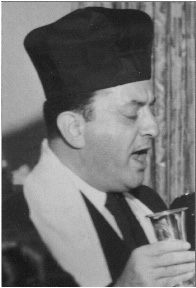Leib Glantz
Leib Glantz was one of the most famous cantors ever, and one of the most important cantor-composers (he sang mostly his own compositions). Glantz was probably also the most individual of all cantors; his singing is unlikely to leave anybody indifferent. You hate him or you love him (his "Machnisei rachamim" recording is a very good example). Already his father and both his grandfathers had been cantors, and Leib Glantz was only 8 years old when he first appeared in a synagogue as a cantor – a child prodigy!, and soon, he traveled all over Europe. In his teens, he organized and conducted a large choir at his father's synagogue, while studying piano at a private music school, and composition at the Kyiv Conservatory with Reinhold Glier. Also at a very young age, he became a very active zionist; between his 21st to his 61st year, he was a delegate to eleven World Zionist Congresses (the last two times as the official representative of Israel). He was a leftist zionist, and the chief editor of a socialist-zionist, Yiddish newspaper in his youth. As a cantor, he got his first post in Chişinău in 1920. In 1926, he was determined to emigrate to Palestine, but took a small detour via the United States, where he was to make some recordings. But since the Ohev Shalom Synagogue in New York City wanted to hire him as their chief cantor, he stayed. Concert tours all over both American continents, Europe, South Africa and, yes, Palestine followed. In 1941, Glantz moved to Los Angeles, where he sang first at the Sinai Temple, then at the Sha'arei Te'filah Synagogue. Other than a cantor and a political activist, Glantz was also a musicologist, and published important theoretical texts on Jewish music. In 1954, he finally did what he had planned to do 28 years earlier, and moved to Israel. He continued to work as a cantor (particularly at the Tif'eret Zvi Synagogue in Tel Aviv), and became immensely popular in Israel. He even sang in opera there twice: Saul in the Israeli opera Shaul b'Ein-Dor by Josef Tal (world premiere 1955) in a January 1958 radio production, and reportedly also Éléazar in La Juive, although I didn't find any indications as to where and when.
Reference 1,
reference 2
|
